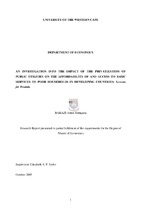| dc.contributor.advisor | Stoltz, Elizabeth | |
| dc.contributor.author | Bakazi, Annet Baingana | |
| dc.contributor.other | Dept. of Economics | |
| dc.contributor.other | Faculty of Economics and Management Sciences | |
| dc.date.accessioned | 2013-05-27T13:36:51Z | |
| dc.date.available | 2007/03/16 15:09 | |
| dc.date.available | 2007/03/30 | |
| dc.date.available | 2013-05-27T13:36:51Z | |
| dc.date.issued | 2005 | |
| dc.identifier.uri | http://hdl.handle.net/11394/255 | |
| dc.description | Magister Commercii - MCom | en_US |
| dc.description.abstract | Three arguments are normally presented as rationale for the privatisation of state owned enterprises. The first relates to the problem of the financing of higher levels of public expenditure; the second is based on the viewpoint that private ownership is more efficient than public ownership; whilst the third claims that the losses of inefficient public enterprise are responsible for excessive budget deficits and other fiscal problems. Although empirical evidence proves that privatisation enhances economic efficiency, it negatively affects the affordability of and access to essential services, which may have serous consequences for poorer households. This happens through increased prices of essential services, such as electricity and telecommunication, as well as through loss of employment opportunities during and after privatisation. Many countries, also in Africa, implemented various types of privatisation programmes over the past two decades in order to decrease the relative size of governments and to improve efficient delivery of services. Towards the end the 1990’s and after the tragic genocide, Rwanda’s Government of National Unity also embarked on an ambitious restructuring programme of its state-owned enterprises. The main purpose of this study was to assess the likely impact of privatisation on poor households in developing countries. The report presents a general overview of the literature, with a specific focus on Brazil, Argentina and South Africa. It investigates the experiences of these countries and derives lessons that can be learnt. Finally it assesses the possible impact of the privatisation of essential service delivery on poor households in Rwanda. The main conclusion of the study is that governments should look beyond efficiency benefits of restructuring and focus on the overall opportunity cost of the privatisation of essential service delivery. The specific method of privatisation may determine the final social impact. The case studies also highlight the need for more research into the challenges facing the privatisation of essential service delivery. It is clear that any restructuring should be preceded by a thorough analysis of the likely impact on the poorer sections of the community. | en_US |
| dc.language.iso | en | en_US |
| dc.publisher | University of the Western Cape | en_US |
| dc.subject | Privatization | en_US |
| dc.subject | Developing countries | en_US |
| dc.subject | Non-governmental organizations | en_US |
| dc.subject | Economic conditions | en_US |
| dc.subject | Economic policy | en_US |
| dc.title | An investigation into the impact of the privatization of public utilities on the affordability of and access to basic services to poor households in developing countries: lessons for Rwanda | en_US |
| dc.type | Thesis | en_US |
| dc.rights.holder | University of the Western Cape | en_US |
| dc.description.country | South Africa | |

